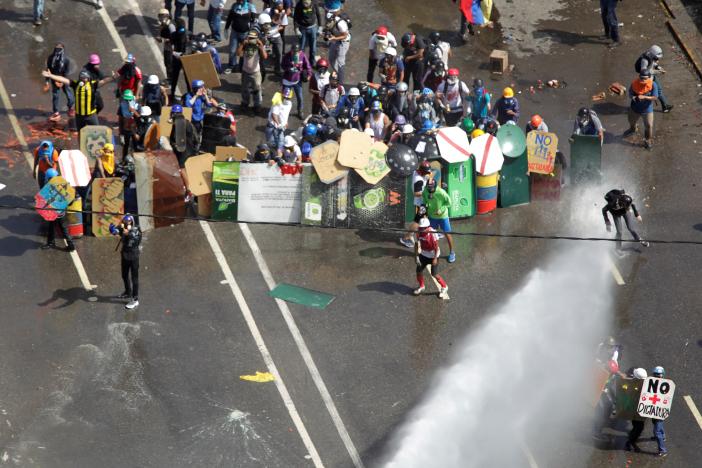Protests against socialist President Nicolas Maduro continued in Venezuela on Friday as the opposition urged demonstrators to rally again on Saturday at the offices of the state media regulator.
Riot police in Venezuela fired tear gas and water cannon to stop anti-government protesters from marching on a key military installation Friday during the latest violence in nearly two months of unrest.
The opposition is trying to sway the support of the armed forces, a key pillar of the government of Maduro, who is resisting opposition calls for early elections.
Retired military personnel joined demonstrators who tried to march to the Los Proceres complex, which houses the defense ministry and lies close to a major military base in Caracas.
Friday’s protest was aimed at “demanding that the armed forces lower their weapons and not be complicit in the dictatorship,” said Freddy Guevara, an opposition leader who is vice president of parliament, the only branch of government the opposition controls.
He called on the military to reject a “constituent assembly” to be elected in July and tasked with drafting a new constitution, saying Maduro’s plans “will liquidate Venezuelan democracy forever.”
Masked protesters threw Molotov cocktails at riot police in scenes familiar after nearly two months of unrest.
A 33-year-old man who was injured Thursday night during a protest in the western city of Cabudare died on Friday, bringing the death toll from eight weeks of unrest to 58.
Several people were also injured in the capital on Friday, including opposition lawmaker Carlos Paparoni, who was struck in the leg with a blunt object.
Attorney General Luisa Ortega blamed military police for hundreds of injuries and at least one death.
Protesters brand the socialist president a dictator, blaming him for economic turmoil and food shortages.
Maduro is resisting their calls for early elections, saying the opposition and the United States are plotting a coup against him.
Despite the opposition’s calls for the military to abandon Maduro, the high command has retained its public support for him so far.
A crowd of Maduro’s supporters in red shirts started a counter-demonstration on Friday near the presidential palace in central Caracas.
The president has launched steps to reform the constitution in response to the crisis. His opponents say that is a bid to dodge elections and cling to power.
The National Electoral Council said those who wanted to stand for election to the constituent assembly to rewrite the constitution should sign up next Thursday and Friday.
Meanwhile, the state telecom regulator Conatel has come under scrutiny for its coverage of the protests.
In the mountains above Caracas, two government officials often stand watch over the antennas of TV news network Globovision, poised to take it off air if regulators object to coverage of anti-government protests, according to two station employees.
They said the 24-hour Venezuelan news station receives regular warnings from Conatel against showing live footage of clashes between anti-government protesters and security forces, or broadcasting terms such as “dictatorship” and “repression.”
“It’s a daily threat,” said one of the employees, citing information from station managers and asking not to be identified for fear of reprisals.
“Conatel is making decisions about coverage.”
In contrast to past waves of unrest in Venezuela, particularly during Hugo Chavez’s 1999-2013 rule, the nation’s three main private television stations have provided minimal live coverage of the latest anti-government demonstrations.
They rarely show more than a few minutes of real-time images of protests.
However, the private networks, including Globovision, do give broadly equal weight to opposition and government leaders and supporters in broadcasts – contrary to assertions by critics that they muzzle the opposition.
“If people abroad sampled Venezuela’s TV media directly, as opposed to judging it by what is said about it by the international media and some big NGOs, they’d be shocked to find the opposition constantly denouncing the government and even making very thinly veiled appeals to the military to oust Maduro,” said Joe Emersberger, a Canadian blogger who tracks Venezuelan media and writes for state-funded Telesur network.
“Focusing on ‘live’ coverage is just a way to avoid acknowledging they (protests) are being extensively covered.”
Regulators do openly describe vigilance of coverage, with Conatel director Andres Mendez recently telling state TV the regulator was constantly evaluating Globovision and some of its anchors. “We sometimes have pleasant conversations with (Globovision’s) president,” he said.
Ruling Socialist Party officials scoff at the idea of any censorship, insisting the government is the victim of a US-supported campaign by private local and international media to depict it as a repressive regime and thus justify a coup.
They recall that private media openly backed a bungled 2002 coup against Chavez, and accuse media of exaggerating the protests to weaken Maduro’s government.
Unable to follow the protests live on TV, many Venezuelans have turned to other sources of information, especially online.
“I find out what’s going on from my phone and social media,” said Claudia Mejias, who watches Colombian network Caracol via cable at the hair salon where she works and then shares information with friends via Whatsapp and Facebook.
Though social media platforms have to some extent supplanted TV news, they frequently transmit inaccurate information.
And only 53 percent of Venezuelans have internet access, according to one local research firm.
